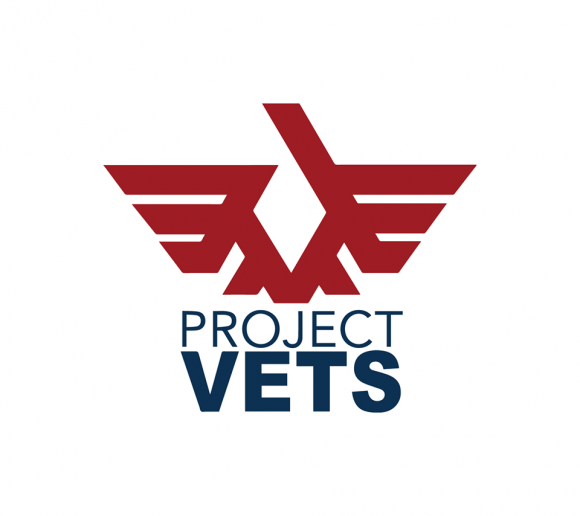Student Veterans: Learning about Critical Issues Along with my Students
March 11, 2016
One of the great joys of teaching is exploring new subjects and learning alongside our students. Today I sat and listened to five passionate speakers talking about the unbelievable and seemingly unending problems many of our military veterans face when they return to their homes after serving our country. It was an astonishing afternoon, made possible by the hard work of five Public Relations and Advertising students who took on this year’s Bateman Case Study competition client, Student Veterans of America.
Cory Vigil of Working Wardrobes was brutally frank about his own struggles as a returning veteran—divorce, incarceration and more. But today, after four tours of service, he’s turned his life around and dedicated it to helping other vets, as a reentry/veterans resource specialist with Working Wardrobes.

Drew Nelson (BA/PRA ’18) with some of the letters Chapman students wrote to veterans.
Vigil talked about how veterans are often reluctant to open up about their experiences to non-veterans, for fear of being judged. When a student asked how members of the community could help those who serve as they struggle with re-entry, he simply said, “Listen.” If people do ask him about his military experiences, he is open to speaking with those “I can tell are sincere.”
One key point he made that hit home with me—even vets who do not see combat have issues returning to civilian life. I have to say, that wasn’t something I had given a lot of thought to.
Chapman Professor Kyndra Rotunda displayed a lot of the passion she brings to her work at the executive director of the Military and Veterans Law Institute. Among her many accolades and accomplishments, Rotunda was a former prosecutor at GITMO and a JAG Corps member at Walter Reed Army Medical Center where she helped handle “imminent death processing” to “retire” victims of the 9/11 Pentagon attack so their survivors could receive retirement benefits. Today, she helps law students and young alumni “find their inner lawyer,” hoping to inspire young lawyers to use their profession to help others.
She spoke about the many cases that go on for years as she and her colleagues work pro bono to help veterans get their benefits, upgrade or challenge an improper discharge (which can limit benefits), and help veterans with many other legal problems, from housing foreclosures to challenging VA policies. Rotunda noted that there are as many as 22 veteran suicides a day, a tragic number that is testimony to the difficulties returning veterans with physical or emotional disabilities face.

One of the many letters to veterans that Chapman students wrote
Bryan Fazio is a Brandman University alum now studying law at Whittier College. His passion—and his command of statistics—were truly impressive. A few quick facts that touched me: there are almost 200,000 veterans in Orange County, the poverty rate among veterans is 2-3 times that of the general population, one in four homeless people in LA is a veteran.
Fazio, a Navy veteran, has had two bone marrow transplants in treatment of Hodgkin’s Lymphoma he contracted at the age of 23, while in the service. His fight to get the health and disability benefits he needs inspired him to go to law school because he saw that “veterans are not getting justice.”
“It’s a disgrace how our veterans are treated,” he said. And how they are treated, in a country where fewer than one percent serve, is “important to American society as a whole.”
Ryan DeLodder of the Hire Heroes program made another point that had never occurred to me. Although you often hear how military skills and training are valuable employment skills, veterans struggle to “translate their military service into corporate language.” He often sees resumes put together by vets that are full of military language and acronyms that are incomprehensible to civilians. Helping veterans accurately and effectively market themselves is a big factor in the success of Hire Heroes in helping veterans make the transition to being gainfully employed civilians.

Bryan Fazio, Brandman University alum and President, Veteran Law Society, Whittier Law School; Ryan DeLodder, Hire Heroes; Barbara Anderson, Hands on Banking for Military; Jamie Coleman (BA/PRA ’16); Sabina Hahn (BA/PRA ’19); Anoud Alomair (BA/PRA ’16); Kara Ojebuoboh (BA/PRA ’18); Chery Borden, Hands on Banking for Military; Drew Nelson (BA/PRA ’18).
Finally, Barbara Anderson talked about the need for financial education among veterans and the Hands on Banking for Military program offering workshops and online learning for vets from Wells Fargo. Anderson made the point that many young people join the military right out of high school, thus they have no experience managing their own finances—creating real problems when they return home and are on their own for the first time.
Health issues, disabilities, PTSD, legal battles, substance abuse, and high rates of poverty, unemployment, homelessness, and suicide—the battles our veterans face at home seem almost larger than whatever combat they may see in the service. The passion and commitment of these speakers to helping the young men and women who offer their lives to serve us touched me deeply. We all need to do more. We truly can’t afford to do less.
It was a privilege for me to learn more about these issues because my students took on this project. They are hoping to help make a difference for the veterans in our midst at Chapman University—and thanks to my students—I know how important this is.

More about the Project Vets Campaign
Five Public Relations and Advertising students are participating in the annual Bateman Case Study Competition sponsored by the Public Relations Student Society of America. This is a national competition in which teams from colleges and universities around the country compete by designing a campaign for a given client. Their campaign to support student veterans and inform other campus constituencies about the importance of supporting veterans who return to campus included the following activities:
- A Salute Our Troops project inviting current students to write letters to our military expressing thanks for their service in conjunction with A Million Thanks, a non-profit created by PRA alumna Shauna Fleming
- The Service and Success Workshop presenting a variety of speakers representing community resources available to student veterans for assistance with employment, benefits, legal issues and financial education.
- A Stories of Service exhibit in Leatherby Library 303 through March 11 sharing letters written by the military from war zones and photos from Afghanistan by Jonathan Chandler , an MBA student
To find out more, visit their
Facebook Page
.


